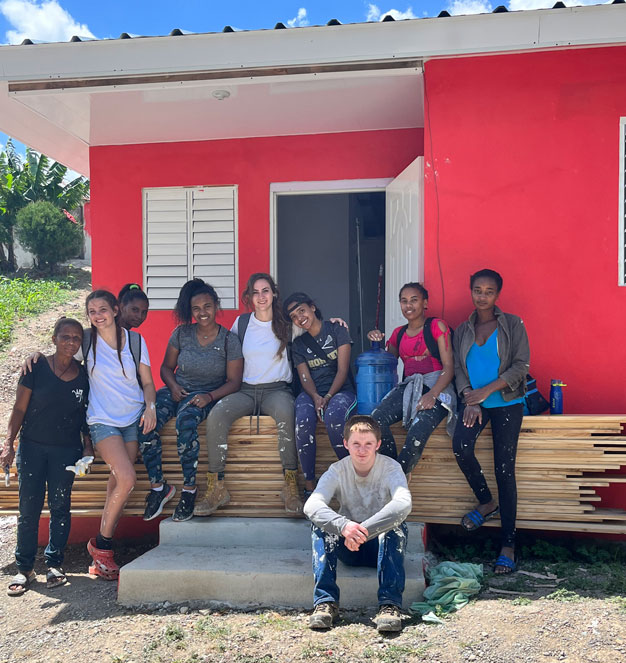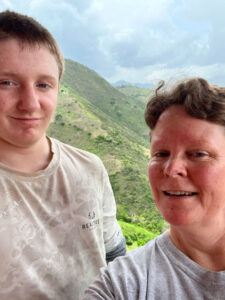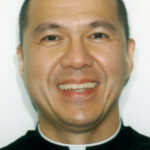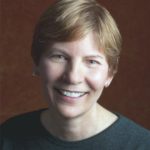
Noah Freeman, front, poses for a photo with volunteers and future tenants of homes in La Cueva, Dominican Republic, during a mission trip last month.
By Lindsay Steele
The Catholic Messenger
Edye Freeman first volunteered with the Catholic Diocese of Orlando’s Dominican mission program as a teenager. “Between 1994 and 2001, I participated in four different missions with them.” She put that part of her life on hold for more than 20 years as she built a life in Keota, Iowa, with her husband, Chuck.
Earlier this month, she returned to the Dominican Republic for a week of service — this time with her teenage son, Noah. “She said it was life changing, so I wanted to experience that for myself,” said Noah, 16.
Edye was excited for Noah to see the world from a unique perspective, she told The Catholic Messenger. In the village of La Cueva, the Orlando Diocese is building 36 three-bedroom, one-bathroom houses “to help get villagers out of the sheet metal and wood shacks they’ve lived in for generations.” She hoped the mission would “touch Noah’s heart and influence his life as much as it has influenced mine.”
The Freemans are members of Holy Trinity Parish in Keota. An Orlando native, Edye felt drawn to the mission’s focus on helping Dominicans become more self-sufficient. That mission, along with the beauty of the Dominican people, kept her coming back. “The people just want to include you in everything and welcome you with open arms,” she said.

Noah Freeman and his mother, Edye, above, worked side-by-side with future tenants of new homes in La Cueva, Dominican Republic, during a mission trip last month. The Freemans are members of Holy Trinity Parish in Keota.
Edye and Noah worked side by side with the future tenants of the La Cueva homes. “The people living in these homes have to put in a certain number of hours working on the homes to help them understand the work that goes into them and they have to make a minimum payment,” Edye says. “They have an understanding and pride in this process.”
The mother-son duo helped primarily with painting. Noah also assisted with electrical work. The houses do not have access to electricity, but tenants will be able to use it when it becomes available. “I’m glad there weren’t live wires, otherwise I would have been zapped way too many times,” Noah joked, noting that the wire color-coding in the Dominican Republic differs from the coding in the United States.
Edye teaches Spanish at Mid-Prairie High School in Wellman and her fluency in the language, and familiarity with the Catholic faith, allowed her to have deep conversations with the future residents. Many identified as Catholic but there was a strong Pentecostal presence, as well. While some of the Dominican Catholics she met choose not to receive Communion due to feelings of unworthiness and shame, their faith is strong. “They put all their faith in God. It’s a farming community and they farm on 60% grades. There is no such thing as crop insurance. This year, they’ve had a horrible bean crop and every one of them will just say, ‘God will provide.’”
Noah felt less comfortable with his Spanish-speaking skills but was able to piece together conversations from two years of high school Spanish courses. In the evenings when volunteers and villagers gathered for meals and fellowship, Noah played volleyball, cards and other games with the Spanish-speaking youths. “Noah did a really good job of just showing children things,” his mom said. “He taught them to play the Speed card game by demonstrating how to play.”
Edye was encouraged by the “huge growth and improvement” in the country since her last visit. “There is reliable power now, running water in most places. That was not the case 20 years ago,” she said, recalling a primitive hospital she saw during her first visit. “It was one room and had a concrete exam table and some metal stirrups. There was no electricity or running water. That was very eye-opening for me as a teenager,” she recalled. “Now, we are working with individual houses that are electricity ready and have running water.”
Edye prepared Noah for the possibility of challenging living conditions during the mission but the mission house had running water, internet connectivity and other amenities. “She over-prepared me,” he said with a chuckle. He imagined himself sleeping in a mud hut with little access to drinking water. However, the absence of hot water was uncomfortable and gave him a “new appreciation” for that amenity. “It almost made me not want to shower but after a long day of sweating, I needed to.”
Edye and Noah appreciated the opportunity to bond as they helped the Dominicans in La Cueva. “It was just awe-inspiring to see (Noah) really put himself out there. He can be a picky eater, but he tried everything he could and interacted with people of all ages, even with the different languages,” Edye said.
“I have such respect for him. He’s a good kid,” she added, eyes welling up with tears as Noah leaned in for a side-hug. “We’ve always been close,” Noah said, “but I feel like this is just another really strong memory that’s going to stay with us forever.”











